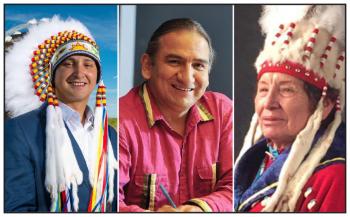Image Caption
Summary
Local Journalism Initiative Reporter
Windspeaker.com
The Assembly of First Nations will not be advocating with the federal government for the creation of a national treaty commissioner’s office (NTCO).
Lines were drawn on Dec. 8, the second day of the AFN’s three-day Special Chiefs Assembly, between those who felt such an office could bolster the voice of treaty holders and those who felt an NTCO had no role with international agreements.
“Our relationship is with the Crown and we must understand that the Crown’s house, the Crown’s governance, who is speaking for us in that circle? Who is making sure of that when we are persevering and asserting our spirit and intent, and other means to the truths of our treaties? This position, this creation is our voice in that house,” said Chief Cadmus Delorme of Cowessess First Nation, party to Treaty 4, who moved the resolution.
Delorme believes that treaty issues are now dealt with by bureaucrats through Sections 91 and 92 of the Indian Act, which makes interactions political.
“(The NTCO) would go in favour to strengthening the treaty relationship of what this country is built on, and what Indigenous people have always wanted fulfilled and we are getting there. So this would strengthen our next 50 years,” he said.
Delorme said the NTCO combined with the recently passed Bill C-15, which directs the federal government to ensure legislation is consistent with the United Nations Declaration on the Rights of Indigenous Peoples, would lift the relationship between First Nations peoples and Canada.
Chief Roberta Joseph of the Tr’ondëk Hwëch’in pointed out that the Yukon had the most modern treaties and self-governing First Nations in Canada and wondered whether the resolution included modern treaty First Nations.
“In terms of some of the challenges that we have is implementing all that we negotiated and it’s taking a very long time. We see this avenue too may be beneficial to us in terms of developing a mandate for implementation of modern treaty agreements,” said Joseph.
“This resolution is to strengthen the colonial house in how they now have to and must interpret the spirit and intent and the treaties from the numbered treaties to the wampum belt to the modern treaties,” said Delorme.
He also said the NTCO could strengthen the Saskatchewan Treaty Commissioner’s Office and “each of the colonial province’s perspective when it comes to the treaty.”
Regena Crowchild, proxy for Tsuut’ina Nation in Treaty 7, had issues with the resolution, which called for the “modernization of Treaty relationships….”
“So what does modernization mean of our treaties? We already know what they are,” she said. “Why are we asking the government of Canada to establish that mechanism?”
Crowchild said Tsuut’ina could not support the resolution as it was written, stressing “organizations have no business in our treaty relationship with the Crown.”
Chief John Martin of the Micmacs of Gesgapegiag also expressed his discomfort with the resolution, pointing out that his area has pre-Confederation treaties. They are “international covenants,” he said, and not for Canada to domesticate.
Chief Dean Sayers of the Batchewana First Nation said he also had reservations supporting the resolution, considering he was “currently sitting at the table periodically” with Canada discussing historic promises made through treaties and agreements with his people.
“There have been … some positive movements there and I am just not comfortable in providing support by way of this resolution to this precarious interaction we are having with Canada at this point… We have to be mindful of that. There are just too many unknowns,” said Sayers.
After the resolution was defeated, Chief Scott McLeod of Nipissing First Nation, who had opposed the resolution, suggested that more planning and more details were required.
“It’s not necessarily a bad idea, in my opinion, but I think it needs a little bit more work before it’s something palatable for most of us. This whole idea of … having a national commissioner on treaties, it makes it sounds like our treaty is not at national level already and it is. We don’t have a treaty with Canada, we have a treaty with the Crown. The only thing we have with Canada is a bad relationship. This organization however it may come about … It needs to focus on the relationships and less about the treaty specifics,” said McLeod.
Chief David Monias of the Pimicikamak Cree Nation in Treaty 5, who also opposed the resolution as it stood, suggested that the AFN be directed to hold a national conference to discuss a national treaty commissioner’s office.
National Chief RoseAnne Archibald said the AFN was there to facilitate the discussions on the resolution and stressed that the NTCO process “would live outside of the Assembly of First Nations.”
This is the second time the resolution has been on the order paper. It was held over from the July 2021 annual general meeting. At that time, Delorme had seconded the resolution.
Local Journalism Initiative Reporters are supported by a financial contribution made by the Government of Canada.

